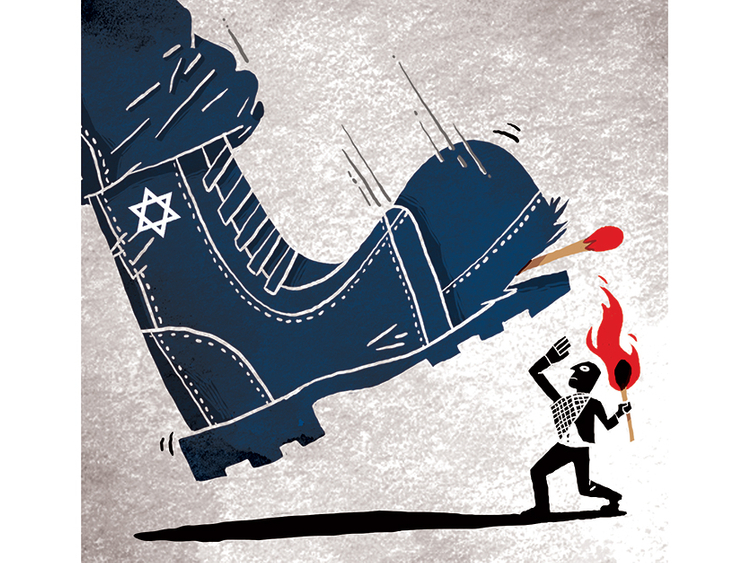On July 14, three Palestinian men killed two Israeli officers stationed at Al Haram Al Sharif compound, which includes — aside from the Al Aqsa Mosque — the famed Dome of the Rock and other Palestinian sites, revered by Muslims. Mohammad Ahmad Jabareen, 29, Mohammad Hamid Abd Al Latif Jabareen, 19, and Mohammad Ahmad Mafdal Jabareen, 19, were immediately killed by occupation soldiers.
On the day of the attack, several Palestinians were killed in various parts of the West Bank and a three-year-old child from Gaza died while awaiting a permit to cross from the besieged region to the West Bank for treatment. None of this registered in international media. The armed Palestinian attack on Israeli soldiers, however, made headlines around the world.
Luis Vazquez/©Gulf News
This is the first time that an attack of this nature has been recorded inside Al Haram Al Sharif. Since 1967, only Israelis have used arms in violent clashes with Palestinians. In contrast, hundreds of Palestinians have been killed in or around this holy shrine throughout the years.
Al Aqsa is believed to be the second mosque ever to be built, the first being Masjid Al Haram in Makkah. The Holy Quran mentions it as the place from where Prophet Mohammad (PBUH) ascended to heaven, journeying from Makkah to Jerusalem.
For Palestinians — Muslims and Christians alike — Al Aqsa took on a new meaning, following the Israeli occupation of East Jerusalem in 1967. Scenes of Israeli soldiers raising the Israeli flag over Muslim and Christian shrines in the city, 50 years ago, are etched in the collective memory of several generations.
Israeli plans in occupied East Jerusalem, however, are far greater than Al Aqsa itself. Last April, the Israeli government announced plans to build 15,000 new housing units in occupied East Jerusalem, in violation of international law. It is, therefore, not surprising that the Al Haram Al Sharif compound has been the focal point of clashes between Palestinian worshippers and the Israeli army.
The international community recognises occupied East Jerusalem as a Palestinian city. The United States, too, accepts international consensus on occupied Jerusalem, and attempts by the US Congress to challenge the White House on this understanding have all failed. That is, until US President Donald Trump came to power. Prior to his inauguration in January, Trump had promised to relocate the American embassy from Tel Aviv to occupied Jerusalem. While the US embassy is yet to officially enact this promise, the new administration is sending a message that it is no longer bound by, and will act in clear violation of, international law with regard to the Occupied Territories.
In response, the United Nations and its various institutions have moved quickly to reassure Palestinians.
Despite US-Israeli pressure, several resolutions have been passed by the UN’s cultural centre, Unesco, and the UN General Assembly, in recent months, which have reaffirmed Palestinian rights in the city.
In response, Israel and the US moved to punish Palestinians for this international consensus.
The Israeli government then opened up the floodgates of colony expansion in the occupied city, after being partially limited from doing so during the presidency of Barack Obama. This was, in part, Netanyahu’s response to UN Resolution 2334, which demanded an immediate halt to Israeli colony construction in occupied Jerusalem and the Occupied Territories.
Since then, the Israeli Knesset began pushing laws that make life even more difficult for Palestinian Jerusalemites, including one that limits the Muslim call for prayer. The law, which passed its second reading last March, was championed by Israeli Prime Minister Benjamin Netanyahu.
The political upheaval has translated on the ground to more violence, as thousands of Israeli occupation soldiers and police were rushed to the city to restrict Palestinian movement and block thousands of worshippers from reaching Al Aqsa. Hundreds were detained in a massive security campaign.
Israeli police expanded the ever-growing list of Palestinians who are not allowed to reach their houses of worship. Palestinians resisted by constantly attempting to reach Al Aqsa or demonstrating in protest. Others, like the Jabareen’s, reached their breaking point.
In the absence of a strong leadership, Palestinians are growing increasingly desperate and angry. The Palestinian National Authority is largely busy with its own pitiful power struggles and appears to have no time for Palestinians, who are left with little hope for a political solution and no clear sense of direction.
Last June, in occupied Jerusalem, speaking to a crowd celebrating the 50th anniversary of the Israeli military occupation of the city, Netanyahu declared that Al Haram Al Sharif would “forever remain under Israeli sovereignty”.
The current upheaval is Netanyahu’s response to the international community. Along with its allies in Washington, the Israeli government is determined to exploit the American support for as long as Trump is in office.
Concurrently, the new US Ambassador to the UN, Nikki Haley, took on the task of silencing any international criticism of the Israeli occupation, referring to international attempts to end the occupation as a form of “bullying”.
Empowered by the Trump administration, Netanyahu seems to believe that his dream of subduing occupied East Jerusalem is being realised. The price of his dream, however, is likely to be costly.
More violence is likely to follow. Palestinians, whose deaths receive not much media coverage, are desperate and angry as their holy city is crumbling under the heavy boots of soldiers, amid international silence and unconditional US support for the Israeli government.
Dr Ramzy Baroud is an internationally-syndicated columnist, a media consultant, an author of several books and the founder of PalestineChronicle.com. His latest book is My Father Was a Freedom Fighter: Gaza’s Untold Story.












